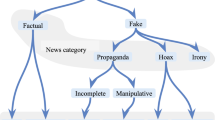Abstract
In a world flooded with information, often irrelevant, lucidity is power. Never as in this historical period can anyone, thanks to new technologies, participate as a protagonist in the debates raised about events and issues that affect our society. In this flood of information, remaining lucid and knowing how to discriminate between real and false becomes fundamental. In this scenario, a leading role is played by Fake News, information that is partly or entirely untrue, divulged through the Web, the media, or digital communication technologies. Fake news is characterized by an apparent plausibility, the latter fed by a distorted system of public opinion expectations, and by an amplification of the prejudices based on it, which facilitates its sharing and diffusion even in the absence of verification of the sources. Fake News is becoming a severe problem that affects various sectors of society: medicine, politics, culture, history are some of the areas that suffer most from the phenomenon of fake news, which can often generate significant social problems. This paper will introduce a probabilistic approach to determining the degree of truthfulness of the information. The system is based on the definition of some features, identified after an analysis of fake news in the literature through NLP-based approaches and statistical methods. The specified features will highlight the syntactic, semantic, and social features of the information. These features are combined in a Bayesian Network, previously trained on a dataset composed of fake news, to provide a probabilistic level of the truthfulness of the information analyzed. The proposed method has been tested in some real cases with very satisfactory results.
Access this chapter
Tax calculation will be finalised at checkout
Purchases are for personal use only
Similar content being viewed by others
References
Tandoc Jr., E.C., Lim, Z.W., Ling, R.: Defining “Fake news”: A typology of scholarly definitions. Digit. Journalism 6(2), 137–153 (2018). https://doi.org/10.1080/21670811.2017.1360143
Baccarella, C.V., Wagner, T.F., Kietzmann, J.H., McCarthy, I.P.: Social media? it’s serious! understanding the dark side of social media. Eur. Manag. J. 36(4), 431–438 (2018). https://doi.org/10.1016/j.emj.2018.07.002
Abd-Alrazaq, A., Alhuwail, D., Househ, M., Hai, M., Shah, Z.: Top concerns of tweeters during the COVID-19 pandemic: a surveillance study. J. Med. Internet Res. 22(4), e19016 (2020). https://doi.org/10.2196/19016
Ahmed, H., Traore, I., Saad, S.: Detection of online fake news using N-gram analysis and machine learning techniques (2017)
Girgis, S., Amer, E., Gadallah, M.: Deep learning algorithms for detecting fake news in online text. In: Paper presented at the Proceedings - 2018 13th International Conference on Computer Engineering and Systems, ICCES 2018, pp. 93–97 (2019) https://doi.org/10.1109/ICCES.2018.8639198
Afroz, S., Brennan, M., Greenstadt, R.: Detecting hoaxes, frauds, and deception in writing style online. In: ISSP 2012 (2012)
Jin, Z., Cao, J., Zhang, Y., Zhou, J., Tian, Q.: Novel visual and statistical image features for microblogs news verication. IEEE Trans. Multimedia 19(3), 598–608 (2017)
Shu, K., et al.: Fake news detection on social media: a data mining perspective. ACM SIGKDD Explor. Newsl. 19(1), 22–36 (2017)
Meel, P., Vishwakarma, D.K.: Fake news, rumor, information pollution in social media and web: a contemporary survey of state-of-the-arts, challenges and opportunities. Exp. Syst. Appl. 153, 112986 (2020). https://doi.org/10.1016/j.eswa.2019.112986
Bondielli, A., Marcelloni, F.: A survey on fake news and rumour detection techniques. Inf. Sci. 497, 38–55 (2019)
Qawasmeh, E., Tawalbeh, M., Abdullah, M.: Automatic identification of fake news using deep learning. In: 2019 6th International Conference on Social Networks Analysis, Management and Security, SNAMS 2019, pp. 383–388 (2019) https://doi.org/10.1109/SNAMS.2019.8931873
De Stefano, C., Fontanella, F., Marrocco, C., di Freca, A.S.: A hybrid evolutionary algorithm for Bayesian networks learning: an application to classifier combination. In: Di Chio, C. (ed.) EvoApplications 2010. LNCS, vol. 6024, pp. 221–230. Springer, Heidelberg (2010). https://doi.org/10.1007/978-3-642-12239-2_23
Chen, Y.C., Liu, Z.Y., Kao, H.Y.: IKM at SemEval-2017 Task 8: convolutional neural networks for stance detection and rumor verification. In: Proceedings of the 11th International Workshop on Semantic Evaluation (SemEval-2017) 2017
Rubin, V.L., et al.: Fake news or truth? using satirical cues to detect potentially misleading news. In: Proceedings of the Second Workshop on Computational Approaches to Deception Detection (2016)
Cordella, L.P., De Stefano, C., Fontanella, F., Scotto di Freca, A.: A weighted majority vote strategy using Bayesian networks. In: Petrosino, A. (ed.) ICIAP 2013. LNCS, vol. 8157, pp. 219–228. Springer, Heidelberg (2013). https://doi.org/10.1007/978-3-642-41184-7_23
De Stefano, C., Fontanella, F., Scotto Di Freca, A. A novel Naive Bayes voting strategy for combining classifiers. In: Proceedings - International Workshop on Frontiers in Handwriting Recognition, IWFHR, pp. 467–472 (2012)
Vosoughi, S., Mohsenvand, M.N., Roy, D.: Rumor Gauge: predicting the veracity of rumors on Twitter. ACM Trans. Knowl. Discov. Data 11(4), 1–36 (2017). https://doi.org/10.1145/3070644. Article 50
Wang, W.Y.: ‘liar, liar pants on fire’: A new benchmark dataset for fake news detection. arXiv:1705.00648 (2017)
Mitra, T., Gilbert, E.: Credbank: a largescale social media corpus with associated credibility annotations. In: ICWSM 2015 (2015)
Colace, F., De Santo, M., Greco, L., Napoletano, P.: Text classification using a few labeled examples. Comput. Hum. Behav. 30, 689–697 (2014)
Colace, F., De Santo, M., Greco, L., Napoletano, P.: Improving relevance feedback-based query expansion by the use of a weighted word pairs approach journal of the association for. Inform. Sci. Technol. 66, 2223–2234 (2015)
Colace, F., Casaburi, L., De Santo, M., Greco, L.: Sentiment detection in social networks and in collaborative learning environments. Comput. Hum. Behav. 51, 1061–1067 (2015)
Author information
Authors and Affiliations
Corresponding author
Editor information
Editors and Affiliations
Rights and permissions
Copyright information
© 2020 Springer Nature Switzerland AG
About this paper
Cite this paper
Casillo, M. et al. (2020). A Multi-feature Bayesian Approach for Fake News Detection. In: Chellappan, S., Choo, KK.R., Phan, N. (eds) Computational Data and Social Networks. CSoNet 2020. Lecture Notes in Computer Science(), vol 12575. Springer, Cham. https://doi.org/10.1007/978-3-030-66046-8_27
Download citation
DOI: https://doi.org/10.1007/978-3-030-66046-8_27
Published:
Publisher Name: Springer, Cham
Print ISBN: 978-3-030-66045-1
Online ISBN: 978-3-030-66046-8
eBook Packages: Computer ScienceComputer Science (R0)




